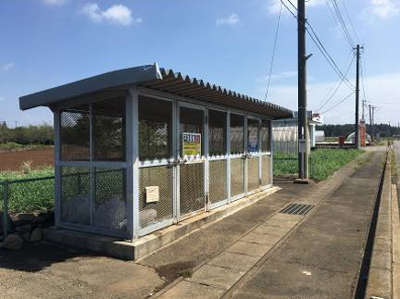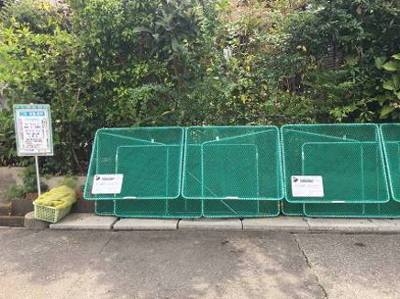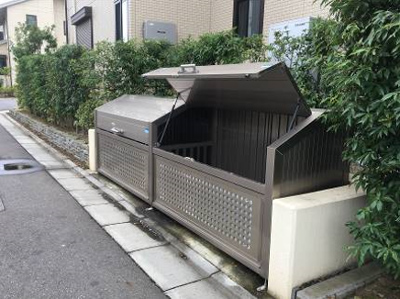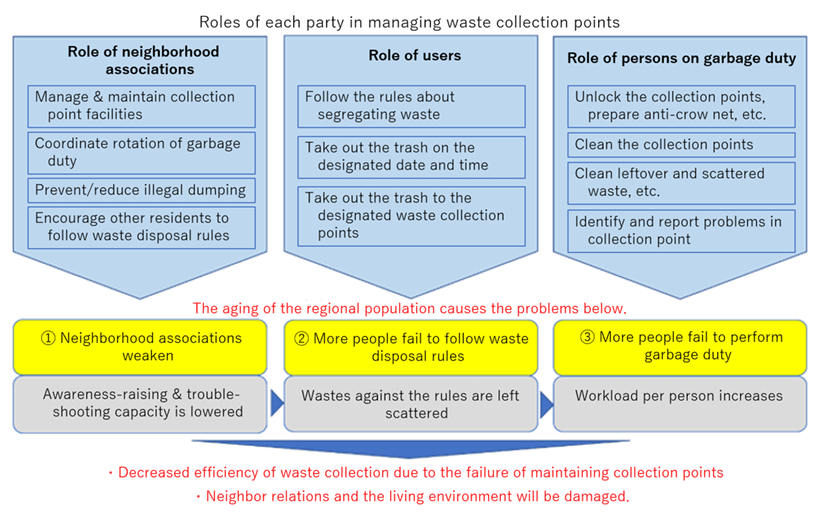- Waste management in Japan
- Circular economy in Japan
- Waste management in Asia
- Disaster waste management
In the Coming Aging Society, How to Manage Waste Collection Points?
History of waste collection points (WCPs)
Where do you normally take out your garbage? To the roadside in front of your house? To a WCP? The method of collecting waste from individual house is called “door-to-door collection,” and the method where multiple households use a common WCP is called “station collection.” In Japan, about 70% of the municipalities collect municipal waste through WCPs. Since the local governments are responsible for waste collection, some people mistakenly believe that WCPs are also managed by municipalities. Though the Wastes Disposal and Public Cleansing Act of Japan does not specify who should manage the waste stations, most municipalities have bylaws or other regulations that require users to properly manage WCPs.
The beginnings of WCPs can be traced back to around 1964, the year of the Tokyo Olympic Games. At that time, in the special wards of Tokyo, food waste was collected by collectors who strolled in towns tinkling bells. A newspaper article at that time said, “Housewives with garbage buckets rush out of their houses to chase a Daihachi Guruma (Japanese hand cart) pulled by waste collectors (Asahi Shimbun, April 11, 1960, morning edition).” Another article said, “Some residents dump their waste into rivers or vacant lots because waste collectors do not appear regularly and dual-income households have no opportunity to dispose of the waste (Asahi Shimbun, July 10, 1960, morning edition).” For combustible and incombustible wastes except for food waste, there was a service that collected them from waste bins installed outside each house. The waste bins made of wood and cement were so heavy that waste collection workers had to rake out the wastes from these.
In order to improve such unhygienic and inefficient systems, these heavy-duty bins were replaced with polyethylene buckets, and regular waste collection service using vehicles was started. In the new system, multiple households take their waste to a roadside WCP, and it was the role of the citizens to decide the locations of collection points and cleaning them. The car collection system gradually spread to municipalities across Japan. With the passage of time, the polyethylene buckets were replaced with plastic bags, but the management of WCPs by the users has continued for more than 50 years.
There are various entities that set up the WCPs: neighborhood associations, resident groups, land developers, and landlords of apartments. Types of collection points also vary depending on their locations and time of installation (Photo 1).
Recently, some municipalities have switched to door-to-door collection in response to citizens' complaints that they have difficulties in taking out waste and managing WCPs. On the other hand, since door-to-door collection may increase the financial burden on municipalities, many municipalities are expected to continue station collection with the cooperation of citizens.
 Shed type mostly found in suburbs
Shed type mostly found in suburbs Framed box type with crow prevention net
Framed box type with crow prevention net Metal box type in new residential areas and apartments
Metal box type in new residential areas and apartmentsConcerns about the management of WCPs in an aging society
As our society faces rapid aging, concerns are growing that our present social systems may no longer function in the future, including the management of WCPs by local residents. To examine effects of the aging population on local waste management, we conducted a survey with all the neighborhood associations chair in Tsukuba City in February 2019. A questionnaire was sent to 608 chairs, and 428 of them responded. The result showed the following three main problems.
- (1) Weakening of neighborhood associations
- In the communities with a high rate of elderly population, there were few people willing to serve as an association board member, and as a result, the work road tends to be concentrated on a few members. Most neighborhood associations play an important role in setting up and repairing WCPs, coordinating rotation of garbage duty, and encouraging local residents to follow the waste disposal rules. If there is a decline in functional capacity of neighborhood associations, the management of WCPs may also be adversely affected.
- (2) More people fail to follow waste disposal rules
- In the communities with a high rate of elderly population, a larger percentage of the respondents stated that elderly people in their communities have difficulties in sorting and taking out waste due to various reasons such as dementia or a long distance from WCPs. These problems can lead to more people failing to follow waste disposal rules, poor hygiene WCPs and hoarder houses.
- (3) More people fail to perform garbage duty
- In the communities with a high rate of elderly population, a remarkably larger percentage of the respondents stated that elderly people in their communities are unable to perform their garbage duty. Those who fail to fulfill the garbage duty may feel guilty, while those who are able to fulfill it may feel that the burden is unfair.
Figure 1 summarizes the relationship between each of the above issues. If neighborhood associations weaken, their capacity for coordination and response to WCP problems would decline. If this happens, violation of waste disposal rules may be neglected, and left scattered wastes are likely to increase because of those brought in an unsorted state or at the wrong time/dates. This will increase the burden of garbage duty, and the burden that is unevenly distributed to a few people will be a factor in the failure of WCP management. This situation may not only hamper proper waste collection, but also damage neighbor relations and the living environment.

For future management of WCPs
In our aging society, what kind of support is needed to continue proper management and comfortable use of WCPs by local residents? We are proposing some methods that could be effective, and there will be a broad spectrum.
- (1) For the communities where neighborhood associations have been weakening:
- Compile, organize and share with individuals and resident groups information about the past roles, activities, and accumulated know-how of neighborhood associations.
- (2) For the communities where more people fail to follow waste disposal rules:
- Consider using communication tools to inform segregation methods and designated disposal date/time for different wastes, easing the rules for elderly, and introducing community support programs for taking out the trash.
- (3) For the communities where more people fail to perform garbage duty:
- Consider reducing the burden of garbage duty on residents and create a system for facilitating mutual assistance between those who can perform garbage duty and who cannot.
There is no right or wrong answer in applying these suggestions. It is important to keep thinking about better ways to manage WCPs, depending on the issues faced by the community.
In our questionnaire survey, a response below has left a strong impression on us from the viewpoint of “keep thinking.”
"One person with mild dementia caused some problems such as losing the on-duty tag when he was on garbage duty. Despite this, I continue to ask him to perform garbage duty because he has a strong sense of responsibility and may be discouraged if he is exempt from the duty. Our community has been watching over his efforts with understanding and support of the WCP users."
We tend to lose connection with the society as we get older. The neighborhood association chair who wrote the above response considered the garbage duty as an important opportunity for the elderly to connect with other local residents. That is why he respected the elderly person’s intention and decided to look after him with other residents. Of course, not all associations are able to take the same approach. What can be done and what must be done in a community varies according to its history, population composition, the state of mutual assistance, and capacity of its neighborhood association. The role expected of us, researchers, is to examine and provide various possible options to support the elderly in each community. To meet this expectation, we will continue our research on the aging society and waste management.
For more information
- Suzuki K., Tajima R., Tasaki T. (2020) Management of municipal waste collection points by residents: current status and aging-related issues in Tsukuba City, The 6th 3R International Scientific Conference on Material Cycles and Waste Management, Abstracts.
- Kojima E., Tajima R. (2019) Let's Take Out the Trash! - A Guidebook for Local Governments and CBOs to Support Elderly People


